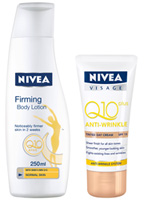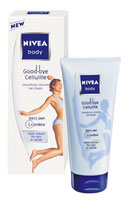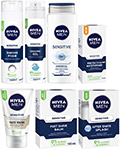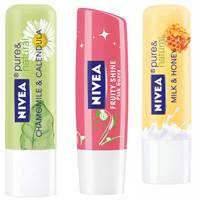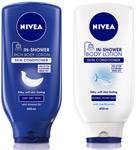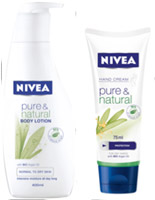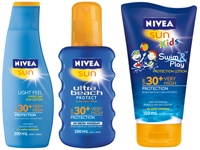Robyn Hutch Mother vs. Daughter Skincare Interview

Nivea Skincare Expert, Robyn Hutch Mother vs. Daughter Skincare Interview
Question: Can you explain how our skin changes as we age?
Robyn Hutch: Our skin changes as we age due to a combination of intrinsic or internal and extrinsic or external factors, ranging from our natural genes to our lifestyle habits. As we age, the skin's natural rate of cell renewal decreases, blood circulation naturally reduces, and your cells become less reactive and experience a loss of elasticity. While this is all happening inside your skin cells what you'll notice over time is your skin loses moisture, becomes is a lot drier, and wrinkles will begin to appear.
Question: How often do we need to change our skincare to reflect our aging?
Robyn Hutch: Your skin naturally changes over time so you need to be aware of what is happening at your skin and as your skin needs change, your skin care should change with it.
Question: Can you compare the skin of a woman in her 20's to a woman in her late 40's and how the products she should use differs?
Robyn Hutch: While you're in your 20's you will start to see the first signs of ageing i.e. fine lines. Typically skin is firm and well moisturised and in terms of skincare may not need a moisturizer that is highly nourishing. By contrast, in our 40's there is naturally a lower level of skin cell components that are needed for skin cell renewal. This means that the rate of skin cell renewal and less blood circulation is decreased, which leads to drier skin and in some cases more defined wrinkles.
In our 20's, women tend to burn the candles at both ends a little more, so I'd recommend Q10Plus Anti-Wrinkle Energising Day Cream, which contains Coenzyme Q10 and added goji berry extract to give your skin a fresh look, while visibly reducing the first subtle signs of ageing. For women in their 40's, I'd recommend NIVEA's Cellular Anti-Age range, which helps to boost cellular energy for improved skin renewal and collagen production.
Question: How can we begin to counter the effects of anti-ageing in our 20's?
Robyn Hutch: While the appearance of our skin is characterised largely by genetics, we actually have a lot of control over the effects of anti-ageing by watching our own lifestyle behaviours, particularly during our 20s. In our environment, anti-ageing is accelerated by sun exposure, pollution and food and alcohol consumption. To counteract those, drink plenty of water, have a balanced diet, keep your alcohol intake to a minimum, moisturise, get plenty of sleep and always wear sunscreen or moisturiser with SPF!
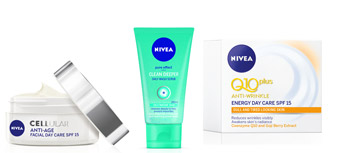 Question: How important is skincare on the effects of anti-ageing vs. diet, hydration and lifestyle?
Question: How important is skincare on the effects of anti-ageing vs. diet, hydration and lifestyle?
Robyn Hutch: Both are very important, but if you carefully manage both, you'll get the best results. A diet full of processed, refined, fatty, sugary or salty foods, or not getting our eight hours sleep regularly can have consequences for our skin. Habits like this can lead to the breakdown of collagen. Collagen occurs naturally in the skin keeping it smooth and firm, so loss of collagen can lead to fine lines and wrinkles. To help avoid dull looking skin, be sure to moisturise daily with a product that contains SPF, such as NIVEA's Daily Essentials Light Moisturising Day Cream with SPF.
Question: How does a product for a teenager differ to a product for a woman in her 40's?
Robyn Hutch: The skin care needs for both are different and as such so are the products. Typically, Young skin tends to be oilier and needs cleansing products that remove excess oil, relieving clogged pores, without stripping the natural oils. In terms of moisturising needs, young skin needs light moisturisers and creams, in comparison to aged skin which needs products that are dry and sensitive skin focused especially for cleansing. For moisturizing something highly nourishing that offers a boost to improve cellular energy will work wonders for skin.
Question: What are your top tips for mother's to teach their daughters the correct skincare habits?
Robyn Hutch: Alongside a healthy lifestyle and a balanced diet, drink plenty of water to keep your skin hydrated, develop a daily morning and evening skincare routine, and keep smiling!
Question: Can you talk about a typical day, for you?
Robyn Hutch: After waking up in the morning I always have a quick look at my skin in the mirror before starting the day. This is just to assess how it feels and looks. After cleansing my face in the shower I apply my moisturizer with SPF and leave it to absorb before applying my makeup. I'm the Consumer Services Manager at NIVEA so I spend my day dealing with consumers and then look at some of the data and any trends that we see in conversations we deal with. When I finally get home I often just cleanse with wipes and apply a night cream before it's off to bed.
Question: What skincare products do you use, daily/weekly?
Robyn Hutch:
Daily:
NIVEA Pure Effect Clean Deeper
NIVEA Refreshing wipes
NIVEA Q10Energy
Robyn Hutch: Our skin changes as we age due to a combination of intrinsic or internal and extrinsic or external factors, ranging from our natural genes to our lifestyle habits. As we age, the skin's natural rate of cell renewal decreases, blood circulation naturally reduces, and your cells become less reactive and experience a loss of elasticity. While this is all happening inside your skin cells what you'll notice over time is your skin loses moisture, becomes is a lot drier, and wrinkles will begin to appear.
Question: How often do we need to change our skincare to reflect our aging?
Robyn Hutch: Your skin naturally changes over time so you need to be aware of what is happening at your skin and as your skin needs change, your skin care should change with it.
Question: Can you compare the skin of a woman in her 20's to a woman in her late 40's and how the products she should use differs?
Robyn Hutch: While you're in your 20's you will start to see the first signs of ageing i.e. fine lines. Typically skin is firm and well moisturised and in terms of skincare may not need a moisturizer that is highly nourishing. By contrast, in our 40's there is naturally a lower level of skin cell components that are needed for skin cell renewal. This means that the rate of skin cell renewal and less blood circulation is decreased, which leads to drier skin and in some cases more defined wrinkles.
In our 20's, women tend to burn the candles at both ends a little more, so I'd recommend Q10Plus Anti-Wrinkle Energising Day Cream, which contains Coenzyme Q10 and added goji berry extract to give your skin a fresh look, while visibly reducing the first subtle signs of ageing. For women in their 40's, I'd recommend NIVEA's Cellular Anti-Age range, which helps to boost cellular energy for improved skin renewal and collagen production.
Question: How can we begin to counter the effects of anti-ageing in our 20's?
Robyn Hutch: While the appearance of our skin is characterised largely by genetics, we actually have a lot of control over the effects of anti-ageing by watching our own lifestyle behaviours, particularly during our 20s. In our environment, anti-ageing is accelerated by sun exposure, pollution and food and alcohol consumption. To counteract those, drink plenty of water, have a balanced diet, keep your alcohol intake to a minimum, moisturise, get plenty of sleep and always wear sunscreen or moisturiser with SPF!
 Question: How important is skincare on the effects of anti-ageing vs. diet, hydration and lifestyle?
Question: How important is skincare on the effects of anti-ageing vs. diet, hydration and lifestyle? Robyn Hutch: Both are very important, but if you carefully manage both, you'll get the best results. A diet full of processed, refined, fatty, sugary or salty foods, or not getting our eight hours sleep regularly can have consequences for our skin. Habits like this can lead to the breakdown of collagen. Collagen occurs naturally in the skin keeping it smooth and firm, so loss of collagen can lead to fine lines and wrinkles. To help avoid dull looking skin, be sure to moisturise daily with a product that contains SPF, such as NIVEA's Daily Essentials Light Moisturising Day Cream with SPF.
Question: How does a product for a teenager differ to a product for a woman in her 40's?
Robyn Hutch: The skin care needs for both are different and as such so are the products. Typically, Young skin tends to be oilier and needs cleansing products that remove excess oil, relieving clogged pores, without stripping the natural oils. In terms of moisturising needs, young skin needs light moisturisers and creams, in comparison to aged skin which needs products that are dry and sensitive skin focused especially for cleansing. For moisturizing something highly nourishing that offers a boost to improve cellular energy will work wonders for skin.
Question: What are your top tips for mother's to teach their daughters the correct skincare habits?
Robyn Hutch: Alongside a healthy lifestyle and a balanced diet, drink plenty of water to keep your skin hydrated, develop a daily morning and evening skincare routine, and keep smiling!
Question: Can you talk about a typical day, for you?
Robyn Hutch: After waking up in the morning I always have a quick look at my skin in the mirror before starting the day. This is just to assess how it feels and looks. After cleansing my face in the shower I apply my moisturizer with SPF and leave it to absorb before applying my makeup. I'm the Consumer Services Manager at NIVEA so I spend my day dealing with consumers and then look at some of the data and any trends that we see in conversations we deal with. When I finally get home I often just cleanse with wipes and apply a night cream before it's off to bed.
Question: What skincare products do you use, daily/weekly?
Robyn Hutch:
Daily:
NIVEA Pure Effect Clean Deeper
NIVEA Refreshing wipes
NIVEA Q10Energy
Sometimes:
Night Cream – Q10 night Or NIVEA Soft Exfoliator: I use the Exfoliator wipes or the Gentle Exfoliating scrub once or twice a week
I only use an eye cream sparingly.
Interview by Brooke Hunter
Have You Seen This?
MORE

